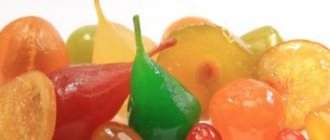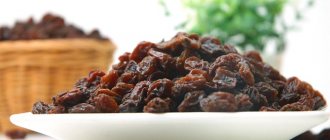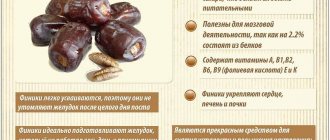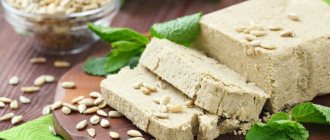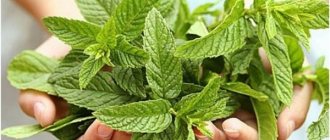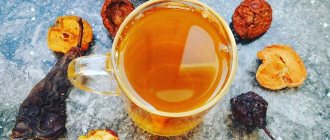Beneficial features
Regardless of the cause of the disease, prunes help regulate the functions of the digestive system in infants, preschoolers and adolescents. It is rich in vitamins and microelements.
The composition of this dried fruit in large quantities includes:
- retinol;
- tocopherol;
- β-carotene;
- ascorbic and pantothenic acids;
- calcium, magnesium, potassium, phosphorus and iron.
All these components have a beneficial effect on the immune system, increase resistance to viruses and pathogenic bacteria (virulent strains of E. coli, salmonella, etc.). They normalize hematopoiesis and promote efficient brain function. Vitamin A improves vision, helps maintain vigilance, and prevents the occurrence of many pathologies.
The energy value of dried plums is 241 kcal (1006 kJ). 100 g of this product contains 2.1 g of protein, 0.4 g of fat and about 63.8 g of carbohydrates.
The laxative effect of dried fruit is due to the presence in it:
- non-chlorogenic phenolic complexes;
- chlorogenic acids;
- sorbitol.
These chemicals moderately stimulate gastrointestinal motility. Slow down the reabsorption of fluid in the large intestine. Bound moisture is retained in the cavity where undigested food remains are located.
Prunes contain a large amount of antioxidants. These compounds neutralize the destructive effect of free radicals that cause the growth of tumors.
Scientists have proven that regular consumption of dried plums can prevent the development of colorectal cancer. Thanks to this product, the microflora of the distal parts of the colon is normalized. The structure of the mucous membrane is gradually restored, and the epithelium begins to fully function.
For constipation, it is useful to eat not only dried plums, but also fresh ones.
Constipation is the absence of bowel movements for several days. The main triggers for this disorder are poor nutrition, lack of water and drinks in the diet, and insufficient physical activity. In children, defecation disorders can also be caused by psychogenic factors. Thus, potty training sometimes turns into real stress for a child if adults are impatient and too demanding of him. Whatever the reason, prunes will help cope with constipation.
Summary
Prunes are good for children's bodies. It contains many substances and vitamins necessary for the child, but in order not to harm the baby’s health (not to cause stomach upset and diarrhea), use prunes only in small quantities. If your child is less than 6 months old, it is best to consult your pediatrician before giving prunes.
For many mothers, prune compote for babies from constipation is a revelation. They are upset why they didn’t know about this miracle drink earlier when they encountered this problem. Let's talk about how prunes can save hundreds of children's bellies from constipation.
Why aren’t girls, along with other subjects, taught the art of being a mother to a baby? Of course, the advice of relatives, the Internet, thousands of books and, finally, the maternal instinct has not been canceled. But there are still things that should have been known earlier.
Prunes are, without a doubt, the number one natural remedy for constipation. Moreover, dried fruit will be equally effective for both adults and children. It is noteworthy that it is perfectly absorbed by the baby’s sensitive digestion, which is only in the formative stage. The immaturity of the digestive tract, by the way, ensures the presence of constipation in infants. As statistics tell us, more than 25% of children encounter them in the first year of life. This means that prune drinks will be a real salvation for their mothers.
Effects on digestion
When peristalsis is disturbed, a person feels heaviness in the abdomen, feels full, and the patient develops abdominal pain. Unpleasant symptoms intensify after eating. Belching may develop, during which a sour taste is observed in the mouth. Another frequent companion to gastrointestinal motility imbalance is heartburn.
When defecation is delayed, the baby becomes restless, capricious and irritable. He often cries, tucking his legs to his stomach. The baby can spend a long time on the potty. Older children even avoid going to the toilet and complain about the inability to “go big.”
Prunes for constipation gently cleanse the gastrointestinal tract. It prevents stagnation of feces and accelerates their evacuation from the body. When consumed, the tone of the smooth muscles of the gastrointestinal tract increases. As a result, the contents of the cavity begin to actively move towards the rectum.
Organic acids present in dried fruit relieve spasms and produce an analgesic effect. The pectins contained in it cause swelling of feces. The walls of the cavity begin to intensively secrete mucous secretions. All this helps to empty the intestines quickly and painlessly.
What is prune decoction used for?
Vegetable soup for a child - a recipe for a baby
Wanting to diversify the baby's diet, the mother should take into account that the functioning of the gastrointestinal tract has not yet been fully established, so loose stools or constipation often occur. Sometimes the baby cries, and the parents cannot understand what is happening. Pediatricians explain that the baby may be bothered by flatulence and bloating, and advise introducing dried fruits in a light form, such as compote, decoction or infusion.
Compote and infusion of prunes support the activity of the baby’s gastrointestinal tract
Prune compote
Prune compote is considered a good remedy for treating constipation in young children. It is recommended that after the baby gets used to the one-ingredient drink, combine it with other dried fruits: dried apricots or raisins.
Prune infusion
Prune infusion is a unique remedy for combating many types of bacteria. Pediatricians say that the beneficial substances in the infusion have a positive effect on the functioning of the cardiovascular system.
Important! Explaining whether prunes can be administered when breastfeeding a newborn, pediatricians do not prohibit using it as an infusion. However, they warn that excessive consumption of dried fruits causes diarrhea.
How many prunes should a child eat if he is constipated?
The dosage will depend on the age of the child. Dried plums should not be given to babies under 6 months of age. If the baby is breastfed, they can be eaten by the mother. On the first day of treatment, you should eat 1-2 fruits during breakfast. They are thoroughly chewed and washed down with 1 glass of warm boiled water. After this, you need to carefully monitor the baby’s reaction during the day. If no rashes appear on the skin, the dosage can be increased the next day. It is allowed to eat up to 5-6 fruits per day.
Preschoolers are recommended to eat 3-4 plums daily. The course of treatment is continued until motor skills are completely improved. After this, for prevention, you can eat 2 dried fruits every morning instead of dessert. They are washed down with sweet tea or a glass of fruit juice. The total duration of treatment is no more than 3 weeks.
During the treatment period, it is important to avoid nervous tension. The situation in the family and kindergarten should be analyzed. It is advisable to discuss the problem with teachers. Everything possible must be done to reduce the emotional stress that the child faces in everyday life.
For school-age children, the amount is calculated based on body weight. If you weigh more than 45 kg, the daily portion should consist of 5-6 plums.
The simplest infusion
This recipe consists of just a few basic steps, so your preparation time will only take a few minutes:
- Take 5-10 fruits and before brewing them, rinse them thoroughly in boiled water.
- Then you should pour 200-250 ml of berries. boiling water and cover the drink with a lid.
- Leave the infusion for 12 hours.
- After this, strain the drink and it will be ready to drink.
We recommend preparing this compote in the evening and leaving it overnight. It is recommended to give it to babies for constipation in the first half of the day, and the first portion will be 1 tsp. For young children, you can dilute it with a small amount of boiled water to achieve a milder laxative effect. This technique also works with decoction: you get healthy water from prunes.
Will prunes help a baby with constipation?
When feeding with artificial formulas, you can prepare a medicinal compote. It has almost the same effect as the fruits themselves. Powdered formulas are absorbed much worse than breast milk. Therefore, in “artificial” people, stool retention is observed much more often. The medicinal compote will help improve digestion even in a small child. It is allowed to be given starting from the age of three months.
After six months, you can include puree in your diet. The starting dosage is half a teaspoon (during morning feeding). It is gradually increased to 20-30 g. It is allowed to add the ground mass to the porridge. Usually, after this, existing problems with bowel movements are completely eliminated.
Constipation Recipes for Babies
Some parents prefer to buy commercially produced products. Puree from jars has laxative properties. However, you can easily prepare it yourself at home.
Puree
You will need clean ceramic dishes and boiling water. Select 7-8 large fleshy fruits and wash them thoroughly. Then the prunes are poured with boiling water and left for 6-7 hours. You can do this in the evening to make fresh puree in the morning. Softened dried fruits are removed from the liquid and rubbed through a sieve with large mesh.
If the plums are severely dehydrated, you can boil them. The fruits are first poured with boiling water and kept in the liquid for up to 12 hours. Then they are placed in a saucepan, cold water is added and the dishes are placed on low heat for 25-30 minutes. After this, the prunes are crushed using a blender.
It is undesirable to add sugar, as it interferes with the breakdown of nutrients in the intestines. In addition, it can lead to a shift in the composition of the microflora, which will cause dyspepsia.
Compote
Dried fruits (10 pieces) are sorted and washed with warm running water. The fruits are placed in a thick-walled pan. Add 300 ml of cold water to the prunes and bring it to a boil. Boil the dried fruits for 10-15 minutes, then remove the container from the heat and add a little honey to the liquid (if the child is not allergic to it). If the baby is not yet 1 year old, use a safer sweetener, such as glucose.
Infusion
Finely chop 100 g of prunes with a knife and pour in 500 ml of boiling water. The dishes are covered with a lid and wrapped in a terry towel or other bulky fabric. The liquid is infused for 12-14 hours. The child is given 100 ml of decoction in the morning - 30 minutes before meals. For children of middle and high school age, the dosage is doubled.
Decoction
The fruits are cut with a knife and placed in a pan. For every 5 dried fruits add 200 ml of water. The container is placed on low heat, brought to a boil and boiled for 25-30 minutes. Then the resulting liquid is cooled and filtered through cheesecloth.
The recommended dosage for children under 3 years of age is 50 ml in the morning (25-30 minutes before meals). When treating a child aged 3-6 years, the amount of medicinal decoction is doubled. Schoolchildren can take 150-200 ml of the product (depending on body weight).
Norms of prune decoction by month to year
In the complementary feeding scheme, prunes and plums are in the same position, but their use has some nuances. For complementary feeding in the summer, plums are given, which have a less pronounced laxative effect; prunes are used in the winter season.
Nutritionists have determined how much decoction can be given to a child:
- 6 months – the norm is 50 ml;
- 7-12 months – the norm increases to 60 ml.
Pediatricians do not recommend sharply increasing the portion of the decoction due to its laxative properties.
Advice. You should pay attention to the stool - if it becomes liquid, the portion should be reduced.
How often to give
To prevent painful digestive disorders, it is recommended to include prune crumbs in the menu 1-2 times a week. It is useful to alternate them: give puree at one feeding, compote at the second. If the stool is disrupted, prunes are excluded from the menu.
Important! It is possible to increase the portion only under one condition - constipation. Then the drink is given to the baby until the condition improves, but not more than the prescribed norm per week for all fruits - 100-120 g.
Quantity of prunes
Due to their properties, prunes are not included in the number of products that make up a child’s daily diet. Therefore, it is important to calculate the amount so as not to cause bowel upset. For the first acquaintance with a new taste, the baby is offered half a teaspoon of puree or 5 ml of decoction, then the serving size is increased.
What can be combined with
To diversify your baby's nutrition, it is useful to add a little prunes to dessert or give them in combination with porridge. Experienced mothers can cook prunes with meat in the second half of the year. Most kids like this combination with their usual dishes, as plum gives them a new taste. However, there are infants who do not take the product. There is no need to force the dish; it is better to come back to it later.
Prunes are useful to combine with cereals and desserts
Prunes for pregnant and lactating mothers
Stool retention is typical not only for babies during the formation of intestinal microflora. Pregnant women are also susceptible to constipation. This condition is often caused by hormonal changes in the body. Some expectant mothers, while expecting a baby, deliberately reduce the amount of fluid they consume because they are afraid of edema. This leads to a lack of moisture in the body and the development of constipation.
Untimely bowel movements are also a common problem for nursing mothers. This is due to the fact that the diet of women during lactation is very different from their everyday diet. Sometimes constipation is caused by intestinal injuries sustained during childbirth.
During pregnancy, prunes can be consumed for constipation. The main thing is that the woman is not allergic to it. The fruits are eaten in the morning - before or during breakfast. The daily dose of dried fruit should not exceed 70-80 g.
Special care should be taken when breastfeeding. On the first day of treatment for constipation, you can eat no more than 1-2 fruits. It is important not to consume other new foods during this time. After this, observe the baby’s reaction. If the child does not have indigestion, the next morning the dose can be increased to 3 fruits.
Recipes
If you are constipated, you don't have to eat prunes alone. You can prepare a delicious dish from it that both children and adults will enjoy.
Prunes with kefir
Select 4 fleshy fruits, wash them thoroughly and chop them with a knife. Pour 150 ml of kefir into the mixture and mix. If desired, you can add a little sugar. The resulting “medicine” is consumed in the evening: 2 hours before bedtime. For children of senior school age, the dosage is doubled.
Dried fruit mixture for constipation
To cope with constipation, prunes can be combined with dried apricots and raisins. Each of these dried fruits helps enhance intestinal motility. It is better to take not bright orange dried apricots, but dark brown ones. The first one has a sour taste, so many children do not like it. The second one is prepared from ripe apricots, due to which it has a sweeter taste. You can rinse the mixture with water, place it on a plate and pour over yogurt. It will be both a medicine and an excellent dessert at the same time.
Candies
Mix in equal proportions:
- dried apricots;
- prunes;
- figs;
- ground walnuts.
Dried fruits are passed through a meat grinder, then nuts and honey are added. The resulting mass is mixed well. Then, use your hands to form dense balls, which are laid out on a plate in one layer. If desired, the candies can be rolled in cocoa powder, sesame seeds, finely chopped nuts or coconut flakes.
How to choose a tasty and healthy product
To prepare a healthy and tasty drink (decoction or compote), you need to choose a quality product.
- Large, fleshy dried fruits will be juicy and sweet. The fruits should be pleasant to the touch, without mucus or unpleasant odor.
- The black color, rich and matte, indicates proper storage. A shiny, glossy color indicates that chemicals have been used. In addition to the lack of benefit from these berries, poisoning may also occur. If the fruits are brown, it means they have been processed for longer storage.
- If the prunes are good, then when they get into the water they become covered with a white coating. For others, it does not appear - when immersed, spoiled prunes lose their shape and turn the water a dark, cloudy color.
- It is better to buy prunes with pits: they are easy to remove, plus the taste will be better and there will be more beneficial properties.
Before using the product, the berries must be thoroughly washed.
In addition to the laxative effect, prunes also have other beneficial properties necessary for a child of any age. He helps:
- increase immunity;
- cope with colds;
- enhance metabolism because it contains a lot of fiber;
- break down fats;
- prevent the deposition of carbohydrates;
- cleanse the body of harmful substances;
- increase vitality;
- relieve fatigue;
- slow down the process of reproduction of E. coli (therefore it is useful to drink in cases of poisoning);
- strengthen the heart muscle.
Prune decoction is not addictive. It can be given to small children starting from 4 months .
Precautionary measures
In addition to useful components, prunes contain a dangerous compound - acrylamide. It is a carcinogen and has neurotoxic effects. If the plums were dried at low temperatures, the amount of this substance will be insignificant. However, its concentration increases when the fruit is exposed to heat. Therefore, prunes should not be eaten regularly.
It is forbidden to exceed the dosage, as this can lead to the development of diarrhea and flatulence. You should not expect an immediate effect: the laxative effect of dried plums develops gradually. During treatment, it is important to ensure that the child drinks enough fluids daily.
At the first sign of an allergic reaction, consumption of prunes should be stopped. After this, you need to give the child an antihistamine. To avoid unwanted consequences, it is better to consult a pediatrician before starting treatment.
Prunes are effective for constipation in a child, but you shouldn’t expect results right away, it’s still not an enema.
The effectiveness of prunes in laxatives
Prunes are included in laxatives as a source of plant dietary fiber.
It is considered an alternative to synthetic fiber. Dried fruits are most often used in the manufacture of natural preparations. Prunes are used along with figs, plantain seeds and seaweed. Dried plums are not only effective in relieving constipation, but also have a mild effect. Drugs containing them can be prescribed over a long period of time. Sometimes such drugs are used as prophylactics. Products with prunes have a long-lasting effect: they ensure the proper functioning of the gastrointestinal tract for a long time. The product does not irritate the intestines, so there is no diarrhea, cramps or other side symptoms after medications based on it. Patients do not experience addiction: the drugs remain effective throughout the entire course, and there is no withdrawal syndrome.
Effective compote
If we compare the effectiveness of all three types of medicinal drinks made from prunes, then compotes for infant constipation will take an honorable first place in this ranking. But it hides sugar in its composition, and for children too young, this is a sure guarantee of an allergic reaction. Because of this property, we recommend giving prune compote to infants older than 6 months and provided that he has already tolerated sugar well in another dish:
- Remove seeds from 200 g of prunes and pour hot water for 5 minutes.
- After this, rinse the berries thoroughly in clean warm water.
- Pour ¼ cup of sugar into the cooking pan, pour 1 liter. hot water and stir.
- After this, place the prepared dried fruits in a saucepan and put the drink on the fire.
- After the compote boils, cook it for about 15-20 minutes: during this time the prunes should soften well.
- All that remains is to strain the compote and wait for it to cool.
